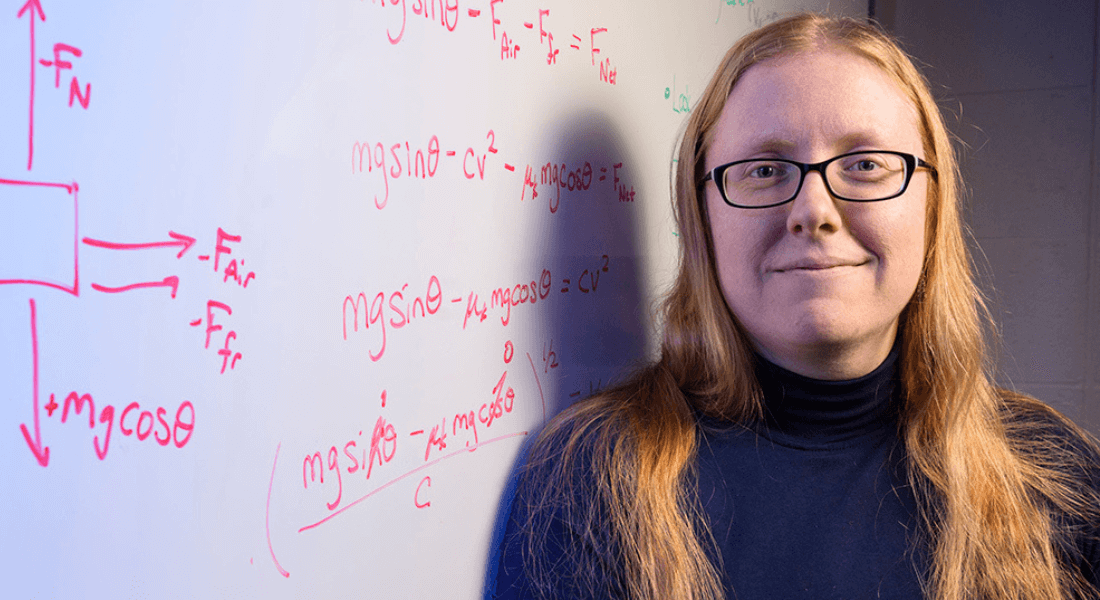New associate professor: We need to make physics more inclusive
Everyone should have the opportunity to learn, enjoy and be moved by physics, without having to look a certain way to fit in, says new Associate Professor of Didactics of Physics Adrienne Traxler.

A rocket drifting sideways through empty space turns it engine on. How will its trajectory look when it turns the engine off again?
This is the gist of question number 23 in the Force Concept Inventory test, which has been used in the United States since the 90s to evaluate the knowledge of physics students. The test is one of the most frequently used of its kind, but for several of the questions – including number 23 – data shows a significant difference in performance of male and female students.
"When these tests were constructed, they were not assessed for gender fairness," explains Adrienne Traxler, new Associate Professor of Didactics of Physics at the Department of Science Education.
Together with research colleagues, Adrienne Traxler has analysed large data sets with responses to physics tests. The results were mixed, but the Force Concept Inventory, one of the most famous and used in the United States, proved problematic.
"We found that if you remove the questions that have gender bias, the performance gap we otherwise see between the genders is halved. Educators should not use the test in a way that can have negative consequences for students."
Too difficult for women
The source of the gender bias in the questions is not simple. Part of the difference may come from complex matters such as how girls and boys have been encouraged differently in math and science since they were children.
"There is no simple fix we can do and solve the problem. But we can make the test better," says Adrienne Traxler.
In the 30 or so years since the test was developed, the understanding of education and gender issues in physics has evolved. But there are still ways to go, says Adrienne Traxler.
"I want everyone to be able to learn, enjoy and be moved by physics, without worrying about their professor telling them that Particle Physics is too difficult for women, which is still said to female students. Everyone should have the opportunity to learn physics without having to look a certain way to fit in."
Discouraging comments
Adrienne Traxler herself was fascinated by physics and science at an early age. With her parents' support, she cultivated her interest, among other things, at Science Camps for girls.
"I've gotten a lot of support along the way. For a long time, I had not met any problems with being a woman in Physics, and I began to think that the stories were exaggerated. But as I got further, it began to become clear that the problems are pervasive. The further I went, the more I realized that I had been extremely lucky," says Adrienne Traxler.
"Many girls and women are met with skepticism and very explicitly discouraging or demotivating comments. Sexual harassment is a widespread problem that I have also experienced myself, just as I have terrible stories from others who have experienced much worse."
"The further I got in physics, the more I realized that there's a point where if you're not on the inside, you have a very different experience of the field. And I want to change that."
Fragmented network
Currently, Adrienne Traxler is part of an American research project that examines the professional networks of female and LGBTQ physicists to see where they get their support from.
"The theory is that you basically find it easier to build a large cohesive network the closer you are to the dominant demographics in physics," she explains.
"We've seen studies in the past among black women in physics that show their networks are becoming more fragmented because they can't find all the support they need in a single place. We're curious if we're going to see the same pattern among LGBTQ physicists and women, two groups that face serious discrimination in the field."
The goal, again, is to find ways for atypical physicists to find a space for themselves in the field.
"I'm interested in how we make science in general and physics specifically a better place for people from different backgrounds. It is bad for physics to lose talent, and it is bad for everyone that people are not treated properly. Both the science and the humans can benefit from making the field a more inclusive place," says Adrienne Traxler.
Patriarchal and hierarchical
It is still not settled exactly which research projects Adrienne Traxler will embark on in Denmark. But the associate professor hopes to continue using network analysis to investigate the conditions that keep some people from settling into physics as a field.
"When you look at how people have gotten to where they are, it's a big diffuse network that spreads over many years and is very difficult to analyse," explains Adrienne Traxler.
"So, I'm interested in how we can study useful chunks of the larger social structures. For example, by seeing what is going on in a classroom or course in order to understand how to get a useful picture of the learning environment that people are a part of through the window that we have access to."
In some respects, Adrienne Traxler expects the challenges to look different in Denmark, where there is both more cultural and legal gender equality than in the United States. But that does not mean the problems do not exist in physics, where the culture internationally is patriarchal and hierarchical, and where the most celebrated and famous role models all are white men, she points out.
"There is a strong connection between the proportion of women in a profession and the perception that you have to be particularly intelligent to be in that profession. Physics is at the very end of both of those scales."
